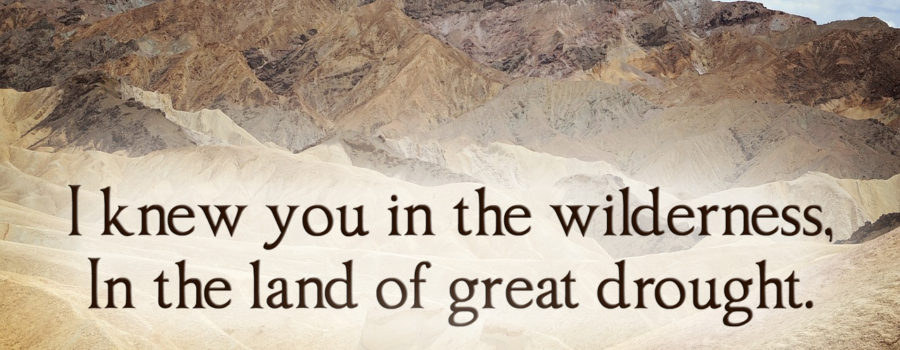The first unexpected source of blessings I want to bring to your attention has to do with “Dry Ground”, for from such an unattractive terrain can germinate the very best God can offer.
A good example of it is seen in the greatest blessing humankind has received. Referring to Jesus, the prophet Isaiah wrote: “For He shall grow up before Him as a tender plant, and as a root out of dry ground” (Isaiah 53:2). Jesus has been and still is our greatest blessing, and in His humanity He is the product of dry ground.
The person who grows amidst adversity develops fortitude. Such a one is able to handle situations too difficult for others. He can run where the average Christian can hardly walk and keep climbing when the majority has quit. He sings amidst tribulations and keeps ranks in the fierceness of the battle. And even in time of drought he keeps bearing fruit.
This is the kind of people the devil fears, those who can bless God from extreme dryness as Job did, and say from the heart: “Though He slay me, yet will I trust Him” (Job 13:15).
What do you think?
The question is the following: Can I trust God when everything around me is scorched by aridity? Can I wait on Him when the surrounding circumstances challenge my deepest faith? Can I follow Him in the valley of the shadow of death? Elijah did. In time of drought he waited on God until the Brook Cherith was utterly dried up. He could have run for his life, but he waited in complete trust. Only when the brook was absolutely desiccated did God speak to him, leading him on.
Prophets don’t grow in rainy weather. They grow amidst confrontations and necessities. They are often rejected, criticized, ostracized, and persecuted. But they don’t quit. As Brother Lawrence wrote: “Lord I am yours, dryness does not matter nor affect me”. These are the words of a man who had crossed the threshold of God’s ways. On the other side of the veil he had understood that the greatest blessings don’t grow by the riversides.
The blessing of endurance
As wonderful as it may be, there are things spiritual rain cannot produce, qualities that cannot sprout in the soil of ease and prosperity. Only in the land of dryness will they germinate and flourish. I don’t refer here to the dryness resulting from sin, but to the kind of aridness God permits for the good of those who love Him.
Vital traits like stability, constancy, and permanence can only develop in a ground that forces the roots downward. Where there is constant rain the tree will not experience deepness since the water can be found at the superficies. In times of storms and sudden droughts such a tree will always be vulnerable. You will often see them uprooted or dried up. But the tree that learns to face dry seasons will descend progressively into the profoundness of God’s provision, for it is obliged by the immediate circumstances to stretch downward to reach the dampness needed for survival.
This is one of the reasons why God provides progressive times of drought, for they hide blessings in their wings that will only be seen after many days. Are we going to trust Him when such times come or run away to find refuge in evangelical wading pools so popular nowadays? What is the point to promote “spiritual” water parks when God wants to bring us into the wilderness to speak comfort to us? (Hosea 2:14)
Brethren! We need providential dryness. We need to learn how to accept what Wisdom sets before us.
The result of dryness
The person who trusts God all the way and embraces all of His provisions—the difficult ones as the pleasant ones—will thrive even in times of extended drought.
Blessed is the man who trusts in the Lord, and whose hope is the Lord. For he shall be like a tree planted by the waters, which spreads out its roots by the river, and will not fear when heat comes; but its leaf will be green, and will not be anxious in the year of drought, nor will cease from yielding fruit” (Jeremiah 17:7,8).
Here it doesn’t say this man will be planted by the water, it says he will be like a tree so planted. Likewise, when it says, “which spreads out its roots by the river”, it refers to the greenness and fruitfulness such a man will display, even in time of prolonged dryness; and all this because he has been progressively challenged by times of extended dryness and constrained to deepen his roots beyond the conventional.
The importance of being rooted deep
Today, there is a deceptive tendency to show-off. The fashion of the day tells us that one must build up quickly so all may see the fruit of his ingenuity. But the Scripture declares that a person must be rooted down first. He must put importance primarily on what people cannot observe directly.
As you therefore have received Christ Jesus the Lord, so walk in Him, rooted and built up in Him and established in the faith, as you have been taught, abounding in it with thanksgiving” (Col. 2:6,7).
To put deep roots takes time and requires periods of providential dryness. There is no way around it. Are we going to follow Jesus’ example and accept the challenge? Paul did. Listen to what he wrote:
And not only that, but we also glory in tribulations, knowing that tribulation produces perseverance; and perseverance, character; and character, hope” (Rom. 5:3,4).
On the way of obedience Paul had learned that times of hostility and privation were glorious seasons carrying invaluable blessings in their bosom. May God lead us to such knowledge, a knowledge that will affect our very character and glorify the Name of the One we claim to love.
Much more will be written about the blessings of dryness. But for now, let us move on.
If you think this post can help somebody else you can share it with the options presented bellow.













